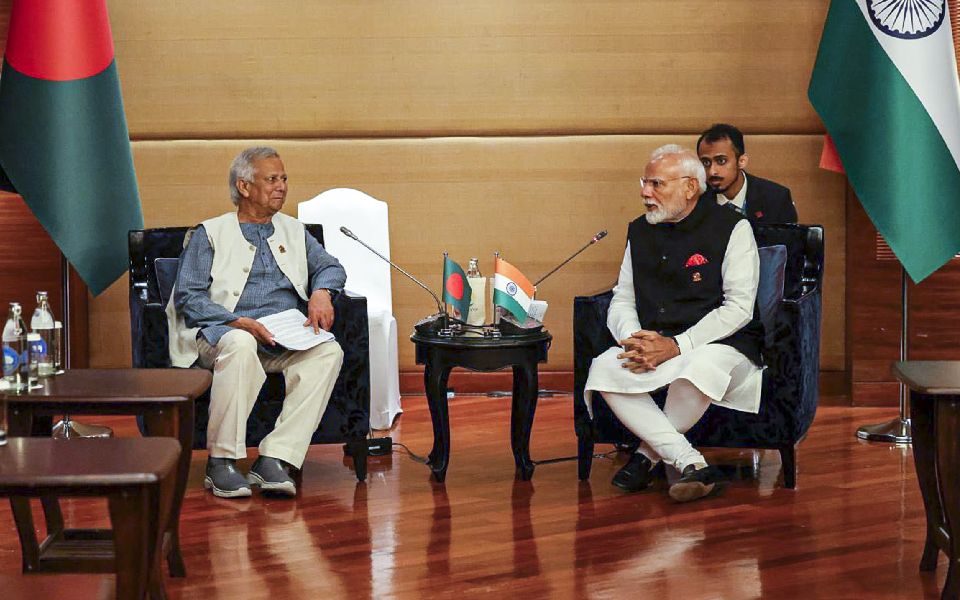05 Apr , 2025 By : Debdeep Gupta

PM Modi met with Bangladesh's Chief Adviser Muhammad Yunus today on the sidelines of the Bay of Bengal Initiative for Multi-Sectoral and Technical Cooperation (BIMSTEC) Summit in Bangkok on Friday. This marked the first meeting between the two leaders since Yunus assumed office following the collapse of the Sheikh Hasina-led government in the neighbouring country.
Yunus took charge of Bangladesh in August 2024 after India's old ally Sheikh Hasina was toppled as prime minister by a student-led uprising and fled to India by helicopter. The subsequent spike in violence against minority Hindus in Bangladesh soured its relations with New Delhi.
The significant visit comes days after Yunus met Chinese President Xi Jinping, where he urged Beijing to extend its economic influence to Bangladesh, controversially mentioning that India's northeastern states being landlocked could prove to be an opportunity.
Notably, Dhaka has also moved closer to India's arch-enemy Pakistan during the festering diplomatic dispute.
Yunus posted a picture on social media on Friday showing him shaking hands with Modi. His press secretary, Shafiqul Alam said later that the "meeting was constructive, productive, and fruitful".
What was discussed in the meeting?
In the 40-minute-long meeting, PM Modi flagged India's concerns over the safety of minorities, including Hindus, and conveyed that any rhetoric that vitiated the environment was best avoided, reported news agency PTI.
On the issue of attacks on minorities in Bangladesh, PM Modi said that he expected the Bangladeshi government to ensure their security and thoroughly investigate cases of atrocities against them.
The prime minister also underscored India’s support for a democratic, stable, peaceful, progressive and inclusive Bangladesh.
“Met Mr Muhammad Yunus, Chief Adviser of the interim government of Bangladesh. India remains committed to a constructive and people-centric relationship with Bangladesh,” PM Modi said in a post on X.
“I reiterated India's support for peace, stability, inclusivity and democracy in Bangladesh. Discussed measures to prevent illegal border crossings and expressed our serious concern for the safety and well-being of Hindus and other minorities,” the Prime Minister said.
PM Modi expressed his conviction that all issues of mutual interest between the two countries would continue to be addressed and resolved bilaterally through constructive discussions, in the interest of their long standing and mutually beneficial bilateral relationship.
Meanwhile, at the meeting, Yunus also flagged the issues of the extradition of deposed Bangladesh prime minister Sheikh Hasina and border killings.
The Prime Minister told Yunus that the strict enforcement of the law and prevention of illegal border crossings, especially at night, are necessary for maintaining border security and stability.
“Bangladesh has made a formal request regarding Sheikh Hasina. It will not be proper for me to say anything more on this matter,” Foreign Secretary Vikram Misri told reporters.
Changing Dynamics in South Asia
For many years, India and Bangladesh have maintained a robust diplomatic, economic, and cultural connection, which is based on their historic collaboration during Bangladesh’s liberation struggle in 1971. Nevertheless, in recent times, friction has appeared in this relationship as Dhaka has intensified its defence, trade, and infrastructure collaborations with China and Pakistan, particularly following the ouster of the Hasina government.
Bangladesh has increasingly turned to China as its primary source for military hardware, procuring a wide array of weaponry, including submarines and advanced missile systems. The Bangladesh-China Defense Cooperation Agreement facilitates deeper military collaboration and the sharing of technological expertise. Notably, the acquisition of two Ming-class submarines by the Bangladesh Navy from China has been interpreted by India as a strategic move by Beijing to project its influence within the Bay of Bengal.
Bangladesh plays a crucial role in China’s Belt and Road Initiative (BRI) and has secured billions of dollars in infrastructure funding from Beijing. Chinese firms have been actively engaged in major development projects, including the Padma Bridge Rail Link and the Karnaphuli River Tunnel. In 2023, China further strengthened economic ties by granting duty-free access to 98% of Bangladeshi exports, significantly enhancing bilateral trade.
While Sheikh Hasina's government had previously maintained a significant distance from Pakistan due to historical reasons, recent months have seen a notable shift with Dhaka engaging in high-level diplomatic discussions with Islamabad. This warming trend was further evidenced in 2024 when Bangladesh and Pakistan resumed talks aimed at boosting bilateral trade and fostering collaboration in textile exports, potentially creating competition for India's established leadership in that sector.
Why does this meeting matters? What’s next?
The meeting between PM Modi and Muhammad Yunus could prove instrumental for New Delhi in resetting ties, reaffirming its commitment to Dhaka, and counterbalancing Beijing and Islamabad’s growing influence.
During the meeting, PM Modi reiterated that India remains a strong ally of Bangladesh and will continue to support its development. He highlighted India’s role in providing energy cooperation, trade partnerships and defence assistance to Bangladesh. The message was clear: India doesn’t want Bangladesh to drift towards China or Pakistan, and is willing to invest in a stronger bilateral relationship.
To ensure this, India could offer Bangladesh better trade agreements to reduce Dhaka's dependence on Beijing. New Delhi might also propose investment in key infrastructure projects, including power plants and transportation networks.
It may also expand defense cooperation, offering Bangladesh better military training and equipment. This could be aimed at countering China’s growing arms sales and preventing Bangladesh from becoming a base for Chinese military influence in the Bay of Bengal.
New Delhi will likely increase educational exchanges, scholarships, and tourism initiatives to strengthen historical and cultural ties. This would help in maintaining strong pro-India sentiment within Bangladesh’s younger generation.
0 Comment